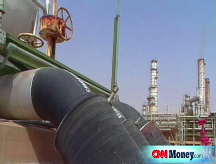The meltdown's silver lining - cheap oil
With experts predicting a global economic slowdown, oil prices could fall to $60 a barrel, or lower - with gas prices soon to follow.
NEW YORK (CNNMoney.com) -- As the world loses confidence in the foundations of its economic system, the silver lining may be that oil prices are about to get a whole lot cheaper.
In a new report Friday, Deutsche Bank uses a number of interesting yard sticks to suggest crude is currently way too expensive and may fall to the $60 a barrel range as the economy worsens.
And the bank does expect the economy to worsen, painting a bleak picture - caused be the current financial turmoil - but stopping just short of predicting a multi-year recession.
The bank says it expects GDP growth to slow by 1.5% over the next few years - and hints that things could get even worse.
"Indeed if one examines the banking sector crises in Japan and Sweden, economic output declined for at least two years following the crisis," Adam Sieminski, the bank's chief energy economist, wrote in a research note. If the global economy slows to less than 2% growth a year, "oil prices could spiral down, much like they escalated in 2007."
Other analysts see oil prices going through the floor.
"As night follows day, low oil prices have always followed high prices, and the decline has always been swifter than the advance," said Peter Beutel, an oil analyst at Cameron Hanover.
Beutel sees a 2009 low of around $50 or $60 a barrel, then even lower prices in 2010.
"I'm not going to rule out some extraordinarily low numbers, even $20 a barrel," he said, acknowledging that five months ago many respectable analysts though we'd never go below $100. "Whatever the market does, it's going to make us all look like fools."
Deutsche Bank compared oil prices to several other measures, and came to the conclusion that "crude oil is the most richly priced commodity currently."
Compared to crude's historic price average of $35 a barrel, it's currently 100% higher, higher than any other commodity. The next highest is gold, at 56%. Many other metals are only 20 to 30% higher.
And contrary to press reports talking about how expensive food is, adjusted for inflation many food stuffs are actually lower than their long-term historical average price, according to the report.
Relative to per capita income, the bank said oil prices would have to fall to about $45 a barrel to return crude to it's historical average.
In the early 1970s, the average American family could buy about 1,000 barrels of oil on a year's salary. That 1,000 barrels was the norm for most of the last few decades, with the exception of the early 1980s and 2008, when that number dropped to around 300 barrels of oil. Today, oil would have to cost around $45 a barrel for the average family to afford 1000 barrels.
The bank also calculated how high oil prices have to be for OPEC countries to maintain their budgets. Iran and Venezuela, who are often the first to call for production cuts, need the highest price per barrel - $95.
Russia needs about $70, while Saudi Arabia, OPEC's largest producer and de facto ruler, needs about $55 a barrel.
Other measures pointed to a higher price for oil. The bank estimates crude needs to cost $80 a barrel to keep new production coming online, and as a percent of a U.S. consumer's disposable income, current prices are about average.
But taking all these measures together, the bank says $60 a barrel seems like a probable place for oil prices to bottom out.
That would represent a gasoline price of just over $2 a gallon. Good news for motorists burned at paying over $4 a gallon for much of the summer, but bad news if that price drop at the pump also comes with a pink slip from the boss. ![]()



